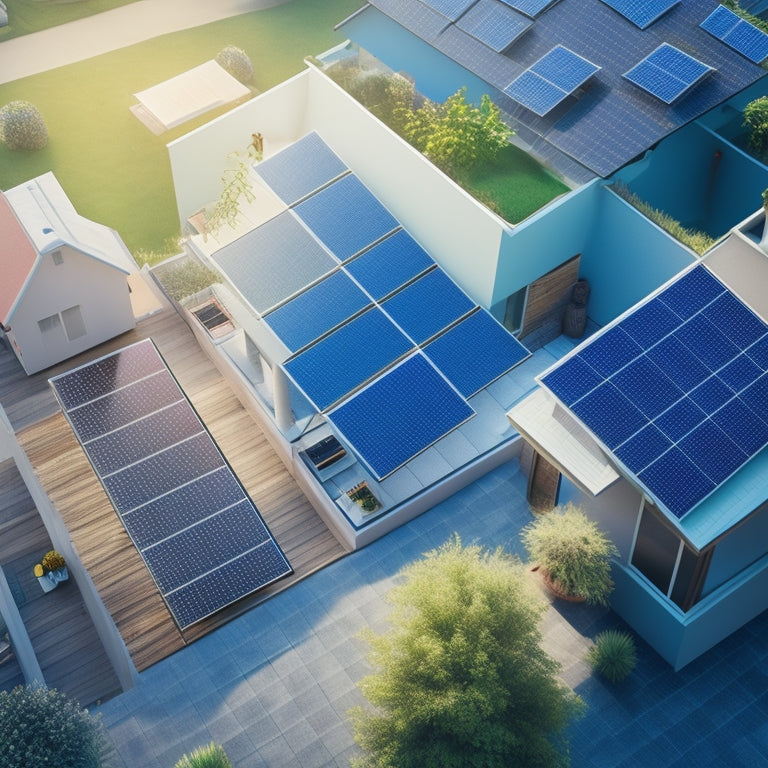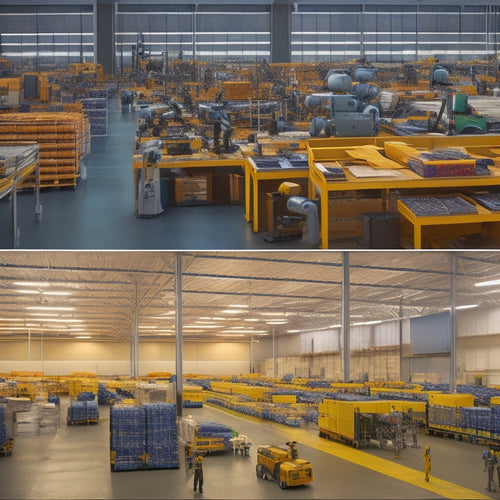
Top Residential Solar Panels by Efficiency Rating
Share
You're looking for the most efficient residential solar panels to maximize your energy output. Top performers include Panasonic's HIT-240 with 21.8% efficiency, SunPower's X-Series with 22.8% efficiency, and LG's NeON 2 with 20.5% efficiency. These high-efficiency panels harness more energy from the same roof space, resulting in substantial energy bill savings. Consider bifacial panels that absorb light from both sides, PERC technology for enhanced efficiency, and silicon wafers with optimized surface textures for increased photon absorption. With so many options, it's essential to compare models and consider warranty terms, aesthetics, and installation logistics to find the best fit for your home - and there's more to explore.
Key Takeaways
• High-efficiency solar panels from reputable manufacturers like Trina, Jinko, and LONGi offer impressive warranties and certifications.
• Compare residential solar panels based on efficiency rating, power output, aesthetics, and installation logistics to find the best fit.
• Top-rated models like Panasonic HIT-240, SunPower X-Series, and LG NeON 2 boast high efficiency ratings and impressive warranties.
• Silicon wafers with optimized surface textures, bifacial panels, and PERC technology enhance photon absorption, leading to higher energy outputs.
• Homeowners can benefit from incentives and rebates for energy-efficient solar panels, which can offset initial costs and maximize energy bill savings.
Highest Efficiency Solar Panels
With efficiencies ranging from 22.8% to 23.6%, the top-tier solar panels boasting the highest efficiency ratings are engineered to maximize energy harvesting, and you can expect to see substantial gains in power output from these premium modules.
As you consider investing in a high-efficiency solar panel system, you'll want to explore the available solar incentives that can help offset the initial cost. These incentives can greatly reduce the upfront expenditure, making high-efficiency solar panels a more viable option for you.
Additionally, pairing your high-efficiency solar panels with energy storage solutions can further optimize your energy independence. By storing excess energy generated during the day for use during nighttime or periods of low sunlight, you can maximize your energy self-sufficiency.
With the right combination of high-efficiency solar panels and energy storage, you can harness the full potential of renewable energy and enjoy substantial savings on your energy bills. By choosing the highest efficiency solar panels, you're making a wise investment in your energy future.
Residential Solar Panel Efficiency
When evaluating residential solar panels, you're likely interested in maximizing energy output and optimizing your system's overall performance. To achieve this, understanding the concept of cell conversion efficiency becomes crucial, as it measures a panel's ability to convert sunlight into usable electricity.
Maximizing Energy Output
You can greatly enhance your residential solar panel system's energy output by optimizing its efficiency, which is important in today's renewable energy landscape. To maximize energy harvesting, it's important to take into account factors that impact your system's performance.
One important aspect is power optimization, which involves adjusting your system's configuration to minimize energy losses and maximize energy production. This can be achieved through ideal panel orientation, tilt, and spacing to guarantee maximum energy absorption. Additionally, using high-efficiency inverters and ensuring minimal electrical losses in the system can further boost energy output.
Regular maintenance, such as cleaning the panels and monitoring system performance, is also critical in maintaining top energy production. By focusing on these key areas, you can significantly increase your residential solar panel system's energy output, providing you with more power and a greater return on investment.
Cell Conversion Efficiency
Your residential solar panel's cell conversion efficiency, measured in percentage, determines how effectively it converts sunlight into electrical energy, directly impacting your system's overall performance. This efficiency rating is critical, as it affects the amount of energy harvested from the sun. A higher efficiency rating means more energy is converted into usable electricity, resulting in greater power output.
When it comes to energy harvesting, quantum physics plays an essential role. The photovoltaic cells in your solar panel utilize the principles of quantum mechanics to convert photons into electrons, generating electrical energy. The more efficient the cell, the more electrons are excited, leading to increased energy production.
As you evaluate solar panels, pay attention to the cell conversion efficiency. Look for panels with high efficiency ratings, typically above 20%. This ensures you're getting the most out of your energy harvesting system. By maximizing energy output, you'll reduce your reliance on the grid and enjoy significant long-term savings.
Top Rated Solar Panel Brands
Leading manufacturers like Trina, Jinko, and LONGi dominate the market with their high-efficiency solar panels, boasting impressive warranties and certifications. You'll want to take into account these top-rated brands when selecting the best solar panels for your residential needs. A brand's reputation plays a significant role in your decision-making process. Look for manufacturers with a proven track record of delivering high-quality products and exceptional customer service.
When evaluating top solar panel brands, you should also take into consideration their warranty options. A thorough warranty can provide you with peace of mind, knowing that you're protected in case of defects or performance issues. Trina, Jinko, and LONGi, for instance, offer warranties ranging from 25 to 30 years, ensuring that your investment is well-protected.
Additionally, these brands have obtained certifications from reputable organizations, such as UL and IEC, which further validate their products' quality and performance. By choosing a top-rated solar panel brand, you can rest assured that you're getting a reliable and efficient system that will meet your energy needs for years to come.
Efficient Solar Panel Technology
High-efficiency solar panels rely on advanced technologies that maximize energy output while minimizing environmental impact, and understanding these technologies is essential to selecting the ideal solar panel system for your residential needs. You're likely aware that traditional fossil fuels are finite, and the world is shifting towards renewable energy sources. As a pioneer in the Green Revolution, you're probably considering solar farming to reduce your carbon footprint. Efficient solar panel technology is the backbone of this movement.
Monocrystalline silicon cells, for instance, boast higher efficiency rates due to their uniform crystal structure. Bifacial panels, on the other hand, can harness energy from both the front and back sides, increasing overall energy output. You'll also come across PERC (Passivated Emitter and Rear Cell) technology, which enhances efficiency by adding an extra layer to the rear side of the panel.
When selecting a solar panel system, consider the technology that best suits your energy requirements and budget. By doing so, you'll be well on your way to harnessing the power of the sun and contributing to a cleaner, greener future.
Residential Solar Panel Comparison
When evaluating residential solar panels, you'll want to compare models based on key performance indicators like efficiency rating, power output, and warranty terms to find the best fit for your energy needs and budget. This comparison will help you make an informed decision, considering factors beyond just efficiency ratings.
Here's a comparison of four popular residential solar panels:
| Model | Efficiency Rating | Power Output (W) |
|---|---|---|
| Panasonic HIT-240 | 21.8% | 330 |
| SunPower X-Series | 22.8% | 440 |
| LG NeON 2 | 20.5% | 395 |
| Trina Solar TALLMAX | 20.3% | 380 |
Beyond performance metrics, consider solar panel aesthetics, such as frame color and panel size, which can impact the overall look of your roof. Additionally, installation logistics, like panel weight and ease of handling, can affect the complexity and cost of installation. By weighing these factors, you can find the perfect balance of performance, budget, and visual appeal for your residential solar panel system.
High Efficiency Solar Cells
As you explore high-efficiency solar cells, you'll notice that their design and technology play a significant role in their performance.
The structure of the cell itself, the type of film used, and even the panel's ability to harness energy from both sides can greatly impact its efficiency.
Cell Structure Matters
You'll find that high-efficiency solar cells owe their superior performance to innovative cell structures that maximize photon absorption and minimize energy loss. These advanced structures enable solar cells to convert sunlight into electricity more efficiently, resulting in higher power output.
One key innovation is the use of silicon wafers with optimized surface textures, which increase the surface area for photon absorption. Additionally, researchers have developed solar cells with embedded quantum dots, tiny crystals that absorb specific wavelengths of light, further enhancing energy conversion.
These cutting-edge designs allow high-efficiency solar cells to achieve remarkable power conversion efficiencies, often exceeding 23%. By optimizing cell structure, manufacturers can minimize energy losses and maximize power output, making high-efficiency solar cells an attractive option for those seeking maximum power output.
Thin Film Technology
In addition to leveraging the benefits of advanced cell structures, manufacturers have also developed high-efficiency solar cells using thin film technology, which enables the deposition of photovoltaic materials on a substrate, further increasing energy conversion rates.
You'll find that thin film technology opens up new possibilities for solar panel design and functionality. For instance, thin film applications can be used to create flexible designs, allowing for more versatile and adaptable solar panel installations. These flexible designs can be easily integrated into building-integrated photovoltaics (BIPV) systems, providing a seamless and aesthetically pleasing way to generate renewable energy.
Additionally, thin film technology offers improved temperature coefficients, reducing the impact of high temperatures on energy output. With thin film technology, you can expect higher efficiency rates and improved overall performance from your solar panels.
As you explore the world of high-efficiency solar cells, you'll find that thin film technology is an innovative solution that's pushing the boundaries of what's possible in residential solar energy.
Bifacial Panels Boost
Bifacial solar panels, which can absorb light from both the front and back sides of the panel, greatly increase energy output, especially when installed above a reflective surface, such as a white roof or a grassy lawn. You'll reap the benefits of bifacial technology, which can boost energy production by up to 25% compared to traditional monofacial panels. This is because bifacial panels can harness energy from the reflected light, increasing your overall energy yield.
The bifacial benefits don't stop there. These panels are also more durable and resistant to degradation, ensuring a longer lifespan and reduced maintenance costs. The added durability means you'll enjoy a higher return on investment over the life of your solar panel system.
Additionally, bifacial panels are designed to withstand harsh environmental conditions, making them an excellent choice for homeowners who want a reliable and efficient solar solution. With bifacial panels, you can rest assured that you're maximizing your energy output while minimizing your environmental footprint.
Best Solar Panels for Homes
When selecting the best solar panels for your home, contemplate high-efficiency models from reputable manufacturers that can maximize energy production while minimizing roof space. You want to guarantee your investment in solar energy pays off, and that means choosing the right panels for your roof.
With the current focus on sustainable living and eco-friendly home decor, integrating solar panels seamlessly into your exterior design is essential. You'll want to ponder the aesthetics of the panels, ensuring they complement your home's architecture and blend in with neighborhood trends. Look for sleek, modern designs that won't compromise your home's curb appeal.
Additionally, take into account the warranty and durability of the panels, as well as the manufacturer's reputation for producing high-quality products. By doing your research and selecting the right solar panels, you'll be generating clean energy and increasing your home's value in no time.
Solar Panel Efficiency Ratings
You'll want to scrutinize the efficiency ratings of solar panels, which range from 15% to over 22%, to determine how much energy they can harness from the sun. A higher efficiency rating means more power per hour of sunlight.
When evaluating solar panels, consider the following key factors:
- Cell efficiency: The percentage of sunlight converted into electricity.
- Temperature coefficient: How well the panel performs in high temperatures.
- Fill factor: A measure of the panel's ability to convert sunlight into usable energy.
Understanding these factors is essential in maximizing your energy output. A high-efficiency panel can be more advantageous, especially in areas with limited roof space.
With the current Solar Policy, homeowners can benefit from incentives and rebates for installing energy-efficient solar panels. Additionally, pairing your solar panels with Energy Storage solutions can guarantee a reliable and efficient power supply.
Residential Solar Panel Reviews
To help you make an informed decision, we've compiled a list of residential solar panel reviews, breaking down the top brands and models by their efficiency ratings, warranty offerings, and overall performance. You'll find that each review highlights the unique features and benefits of each panel, including their ability to maximize energy production and minimize maintenance costs.
When choosing the right solar panel for your home, you'll want to take into account factors such as Solar Incentives, which can greatly reduce the upfront cost of installation. Additionally, Panel Maintenance is important to guarantee peak performance and extend the lifespan of your system.
Our detailed reviews cover the top brands, including SunPower, Panasonic, and Trina, among others. We've analyzed their efficiency ratings, ranging from 15% to 22.8%, to help you determine which panel is best suited for your energy needs.
Frequently Asked Questions
Can I Install Solar Panels on a Shady Roof?
You can install solar panels on a shady roof, but you'll need a Shading Analysis to determine the impact of shade on energy production, considering factors like Roof Orientation, tree coverage, and nearby structures.
Do Solar Panels Work During Power Outages?
You're not "flying blind" when it comes to solar power during outages; grid-tie systems won't work, but you can install a battery backup system to keep the lights on, providing a reliable power source when you need it most.
Are Solar Panels Resistant to Hail Damage?
You'll be relieved to know that solar panels are designed to withstand harsh weather conditions, including hail storms, thanks to their durable materials and robust construction, ensuring peak performance and weather durability.
Can I Expand My Solar Panel System Later?
Imagine adding a new electric vehicle to your household; you'll need more power. Fortunately, you can expand your solar panel system later, enjoying seamless system upgrades and energy scalability, ensuring you're always powered up.
Do Solar Panels Void My Roof Warranty?
You're wondering if solar panels void your roof warranty. Typically, they don't, but it depends on the roofing manufacturer's terms. Conducting regular roof inspections and ensuring warranty transfers to the new system can mitigate potential issues.
Related Posts
-

Find Your Eco-Friendly Motorcycle for a Sustainable Ride
You're shifting gears towards a more sustainable ride, opting for an eco-friendly motorcycle that combines thrill wit...
-

Why Are Online Prices for Panels So Low?
When you buy panels online, you're often taking advantage of a combination of factors that drive prices lower. You're...
-

7 Best Financial Incentives for Residential Homeowners
You're entitled to a range of financial incentives that can help offset the costs of owning a home, from federal tax ...


